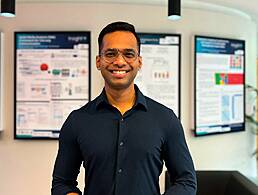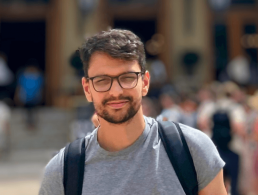Yahoo’s Siddhant Goswami discusses his work in Yahoo’s cyber defence team and shares his tips for minimising stress at work.
Siddhant Goswami is a data engineer working in Yahoo’s cyber defence team, also known as ‘the paranoids’, where his duties lie in protecting Yahoo consumer, customer and corporate data.
Goswami came to Ireland four years ago to pursue a master’s degree in data analytics at the National College of Ireland. Prior to joining Yahoo, he worked as a data analyst at Bank of Ireland for two years, as well as a brief stint as a data engineer at Dublin Airport Authority.
He says that, despite working as a data engineer for more than two years, he finds that using his data skills in cybersecurity has been the most “exciting and fulfilling”. Here, he talks about his experience working with the paranoids.
‘Technology is all about innovation’
If there is such a thing, can you describe a typical day in the job?
My day starts with checking the data pipeline error report, which collects logs used by detection engineers to ensure our users and infrastructure is safe from any cyberattacks. I like to devote some time each day to reading reports of recent cyberattacks or new ideas and techniques introduced in data engineering and analytics.
I prioritise my daily tasks using Jira, which usually involves writing Python code or researching solutions to existing problems in the data pipeline or improving efficiency. Throughout the day, I meet with my colleagues to brainstorm our ideas and action plans, or with our stakeholders to discuss their requirements and data pipeline queries. I like to end my day on a light note so I usually spend the last half an hour of my day doing documentation work.
What types of cybersecurity project do you work on?
In recent years, we have seen a phenomenal rise of machine learning (ML) and data analytics in every domain and cybersecurity is no exception. I was hired to work on a very specific project to build a data pipeline that collects, transforms and cleans logs used for threat detection and response.
The data pipeline was developed in three phases. Phase one was the creation of an automated periodic process of collecting raw data (logs) in real time from sources listed by our stakeholders in the AWS S3 bucket. Phase two involved cleaning and transforming varied raw data in a common schema and normalising it, making it easier for detection engineers to understand data and identify threat objects and threat actors. Phase three enables programmatic access to the data so that detection engineers can apply ML techniques to find anomalies and patterns in existing data.
What skills do you use on a daily basis that are specifically helpful in cybersecurity?
Technology is all about innovation. You have to be creative and able to think outside the box to find solutions in day-to-day challenges. Each day brings a new challenge and every problem requires a new approach, so you have to constantly learn and apply your new knowledge to achieve results.
You have to be great at coming up with the most optimal approach, prioritising and fulfilling the needs of your stakeholder and also making your solution cost-efficient – that’s where you have to be creative with your ideas. One skill that I have honed most while working in this role is being resilient, and I will quote one of my colleagues here: “Try and fail fast”. There is no way you are going to solve any problem in your first attempt, so you try and re-try and learn from your mistakes as quickly as possible.
What are the biggest challenges when working in cybersecurity?
I’ve been working in cybersecurity for more than a year now and I have realised the importance of keeping your digital landscape secure. This can be as simple as setting a strong password for your mobile device or constantly changing your social media passwords using password managers. As a cybersecurity professional, you or people you care about are targeted by threat actors, so you have to be very cautious and vigilant to avoid the traps.
Do you have any productivity tips that help you through the day?
I like to make the most of my time and aim to minimise stress. I usually follow the 50-10 rule where I divide my work into sessions of 50 minutes and then take a 10-minute break. I avoid interacting with any screen (mobile or TV) during that break and either read a book or make a snack for myself or simply go to my backyard to stretch my legs. While working, I like to tune into some jazz or listen to nature sounds for focus and concentration.
What skills and tools are you using to communicate daily with your colleagues?
We use Slack for instant messaging, facilitating quick and efficient communication within our team, while Google Meets serves as our go-to platform for video conferencing, allowing for face-to-face interactions.
How has this role changed as the cybersecurity sector has grown and evolved?
The need to leverage data cannot be understated when tech like generative AI is taking the world by storm. Similarly, leveraging data for threat hunting or anomaly detection using machine learning is the next big thing. This gives a lot of scope and opportunity for data engineers who can build the data infrastructure and create ML models or dashboards, which will be in huge demand in the cybersecurity domain.
What do you enjoy most about working in cybersecurity?
The mission of our team is to protect Yahoo consumers, employees, infrastructure and data through detection and response to threats. I take immense pride in our motto and how my work directly impacts to stop bad guys from hurting millions of people who are using Yahoo every day. This works as a great motivator to keep working hard and makes me realise the opportunity that I have been given to make a difference.
What advice would you give to someone who wants to work in cybersecurity?
If you’re someone who loves technology, open to learning new things every day with an intention to make this world a better place, then cybersecurity would be a great career choice.
Find out how emerging tech trends are transforming tomorrow with our new podcast, Future Human: The Series. Listen now on Spotify, on Apple or wherever you get your podcasts.




